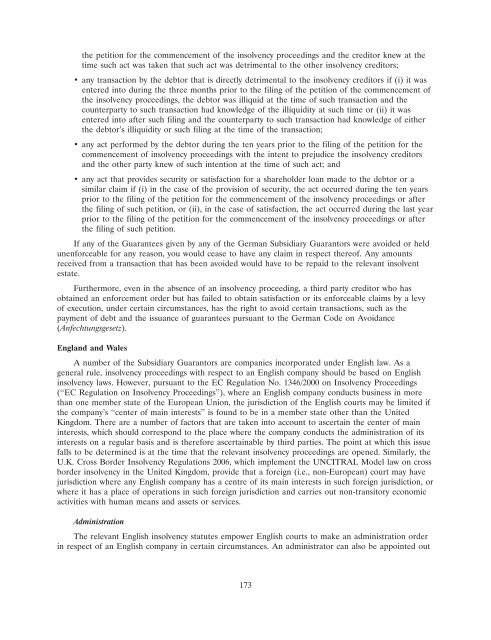Ardagh Glass Finance plc - Irish Stock Exchange
Ardagh Glass Finance plc - Irish Stock Exchange
Ardagh Glass Finance plc - Irish Stock Exchange
You also want an ePaper? Increase the reach of your titles
YUMPU automatically turns print PDFs into web optimized ePapers that Google loves.
the petition for the commencement of the insolvency proceedings and the creditor knew at the<br />
time such act was taken that such act was detrimental to the other insolvency creditors;<br />
• any transaction by the debtor that is directly detrimental to the insolvency creditors if (i) it was<br />
entered into during the three months prior to the filing of the petition of the commencement of<br />
the insolvency proceedings, the debtor was illiquid at the time of such transaction and the<br />
counterparty to such transaction had knowledge of the illiquidity at such time or (ii) it was<br />
entered into after such filing and the counterparty to such transaction had knowledge of either<br />
the debtor’s illiquidity or such filing at the time of the transaction;<br />
• any act performed by the debtor during the ten years prior to the filing of the petition for the<br />
commencement of insolvency proceedings with the intent to prejudice the insolvency creditors<br />
and the other party knew of such intention at the time of such act; and<br />
• any act that provides security or satisfaction for a shareholder loan made to the debtor or a<br />
similar claim if (i) in the case of the provision of security, the act occurred during the ten years<br />
prior to the filing of the petition for the commencement of the insolvency proceedings or after<br />
the filing of such petition, or (ii), in the case of satisfaction, the act occurred during the last year<br />
prior to the filing of the petition for the commencement of the insolvency proceedings or after<br />
the filing of such petition.<br />
If any of the Guarantees given by any of the German Subsidiary Guarantors were avoided or held<br />
unenforceable for any reason, you would cease to have any claim in respect thereof. Any amounts<br />
received from a transaction that has been avoided would have to be repaid to the relevant insolvent<br />
estate.<br />
Furthermore, even in the absence of an insolvency proceeding, a third party creditor who has<br />
obtained an enforcement order but has failed to obtain satisfaction or its enforceable claims by a levy<br />
of execution, under certain circumstances, has the right to avoid certain transactions, such as the<br />
payment of debt and the issuance of guarantees pursuant to the German Code on Avoidance<br />
(Anfechtungsgesetz).<br />
England and Wales<br />
A number of the Subsidiary Guarantors are companies incorporated under English law. As a<br />
general rule, insolvency proceedings with respect to an English company should be based on English<br />
insolvency laws. However, pursuant to the EC Regulation No. 1346/2000 on Insolvency Proceedings<br />
(‘‘EC Regulation on Insolvency Proceedings’’), where an English company conducts business in more<br />
than one member state of the European Union, the jurisdiction of the English courts may be limited if<br />
the company’s ‘‘center of main interests’’ is found to be in a member state other than the United<br />
Kingdom. There are a number of factors that are taken into account to ascertain the center of main<br />
interests, which should correspond to the place where the company conducts the administration of its<br />
interests on a regular basis and is therefore ascertainable by third parties. The point at which this issue<br />
falls to be determined is at the time that the relevant insolvency proceedings are opened. Similarly, the<br />
U.K. Cross Border Insolvency Regulations 2006, which implement the UNCITRAL Model law on cross<br />
border insolvency in the United Kingdom, provide that a foreign (i.e., non-European) court may have<br />
jurisdiction where any English company has a centre of its main interests in such foreign jurisdiction, or<br />
where it has a place of operations in such foreign jurisdiction and carries out non-transitory economic<br />
activities with human means and assets or services.<br />
Administration<br />
The relevant English insolvency statutes empower English courts to make an administration order<br />
in respect of an English company in certain circumstances. An administrator can also be appointed out<br />
173
















